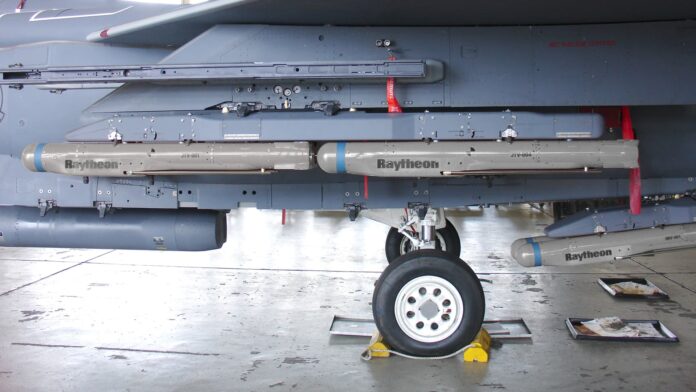An F-15E fighter aircraft can carry seven groups of four StormBreaker bombs.
Source: Raytheon
As the war between Israel and the militant group Hamas heated up last month, Kenneth Suna took to his investment-focused TikTok account.
Suna began a video asking his more than 200,000 followers, “If you’re cool with profiting from war,” before adding, “I’m not.” He then listed the names and benefits of defense-focused funds , including the iShares US Aerospace & Defense ETF (ITA) and that SPDR S&P Aerospace & Defense ETF (XAR).
“You have a choice about where your money goes,” the 38-year-old Washington, D.C., resident told CNBC. “I would feel guilty.”
Suna is among a group of everyday investors who, for moral reasons, avoid the “return at all costs” mentality. As the recent geopolitical conflict escalates, these investors are ignoring defense stocks despite the market’s belief that these holdings tend to perform better in times of war.
In fact, the iShares US Aerospace & Defense ETF rose more than 4% in the week following the Hamas attack on October 7, ending October up about 3.7%. Now the benchmark S&P 500 The index gained just 0.5% for the week and ended the month down 2.2%.
Ignoring market wisdom
Retail traders flocked to defense stocks and funds after the invasion, but inflows have since cooled, according to Vanda Research. Defense giant RTXwhich Vanda said was one of the top sector picks among retail investors, has risen 14% since the start of October.
But not everyone sees the worsening conflict as a reason to invest in defense stocks. Weapon Free Funds, a screening tool for measuring defensive risk in portfolios, including the funds in your 401(k), saw a fivefold increase in visits between the attack and early November compared to the 30 days before.
Weapon Free Funds is one of a suite of tools from nonprofit shareholder advocacy group As You Sow designed to help people check whether their fund money is invested in companies that address issues such as weapons or deforestation. Andrew Behar, CEO of As You Sow, said those with money in large funds can find it particularly difficult to figure out which companies to invest in.
“The person who earns the money should have the right to decide how it is invested and should be able to invest in accordance with their values,” Behar said. “We’re finding that there’s a really strong connection between people who want this but don’t know how to do it.”
The screening platform gives funds a letter grade. An “A” means no stocks were flagged in a military weapons screening, while an “F” means more than 4% of stocks were reported. (For reference: the SPDR S&P 500 ETF Trust (SPY)which tracks the broad S&P 500 index, received a grade of “D”.
155mm artillery shells are inspected on the production floor at the Scranton Army Ammunition Plant in Scranton, Pennsylvania, April 12, 2023.
Hannah Beier | Getty Images
Critics of defense companies have pointed out that demand for their products can increase in times of heightened geopolitical conflict. The impact of the recent war on these companies has already become clear: General dynamics Chief Financial Officer Jason Aiken told analysts last month that artillery demand would likely face “upward pressure” as the Israel-Hamas conflict broke out alongside the ongoing war between Russia and Ukraine.
Those with moral concerns have also in the past highlighted the number of war deaths as a reason for their unease.
The recent surge in interest in Weapon Free Funds exceeded what was seen in February and March 2022 following the Russian invasion of Ukraine, As You Sow said.
This may be related to differences in public consensus about how these conflicts should be resolved. While there has been overwhelming international support for Ukraine to fight back with arms, opinions on the war between Israel and Hamas appear to be more mixed as calls for a ceasefire grow.
Draw the line
These moral calculations are the latest example of a growing trend among some investors to want their investments to reflect personal values. In one of the latest data points on this relationship, US Bank found that more than four-fifths of Generation Z and Millennials would underperform the 10-year return of the S&P 500 to ensure that the companies they invested in corresponded to their beliefs.
“A common decision-making process is that if I represent a value that is anti-war, I don’t want to own stocks that enable war,” said Brad Barber, a finance professor specializing in investor psychology at the University of California, Davis. “It’s a pretty easy way to invest in a way that’s consistent with your values.”
Meanwhile, Suna said he can feel caught between two schools of thought. There are people who tell him there will be war anyway, so he might as well pay attention to the returns on defense stocks. On the other side of the spectrum, he heard younger people say they don’t invest because no company is perfect or because they view the stock market as an unfair wealth creation system.
Suna walks a fine line: for him, investing means the possibility of one day retiring, but at the same time he needs to feel morally confident about where his money is going. Although he said decisions about where to invest can sometimes be difficult or complex, the decision to avoid defense stocks wasn’t a particularly difficult one.
“More and more young people are saying, ‘You know what? You can invest however you want, but I don’t agree with it,'” Suna said. “Everyone draws the line somewhere.”















